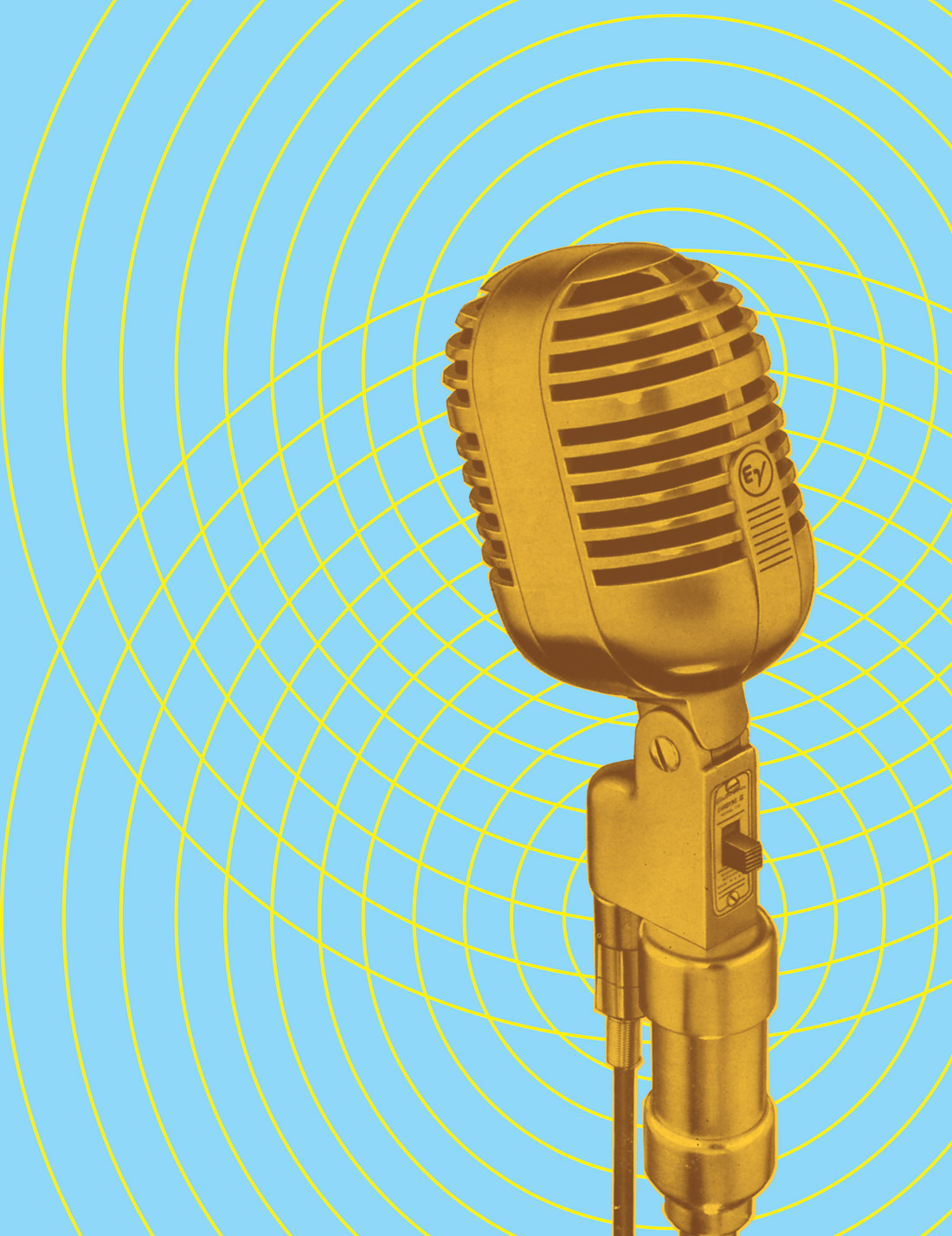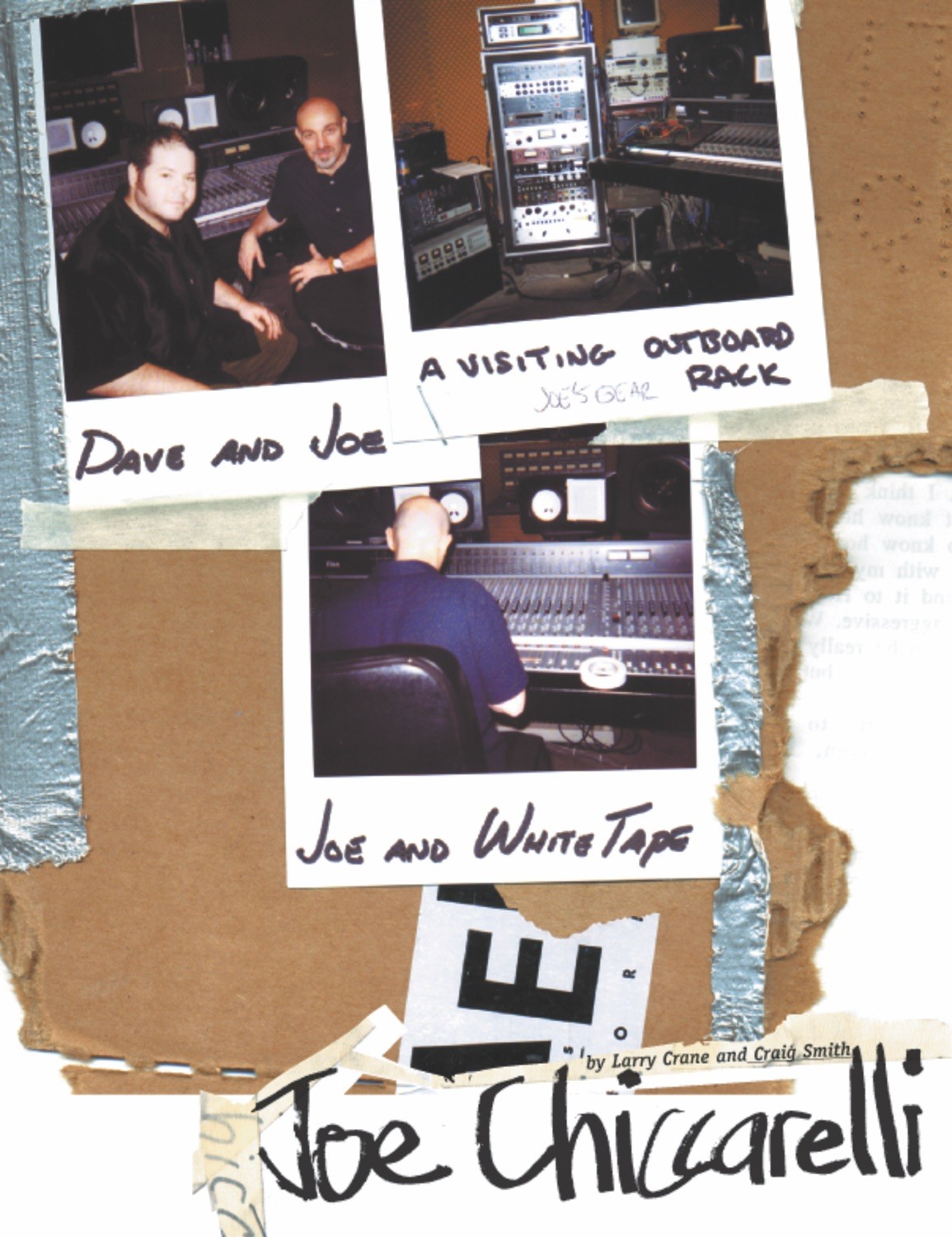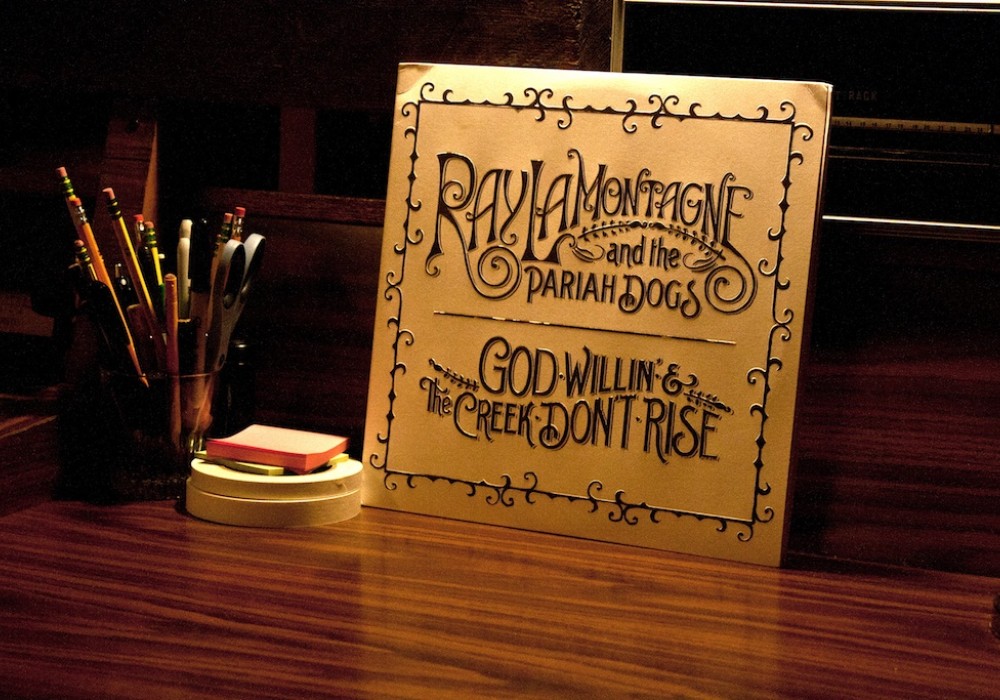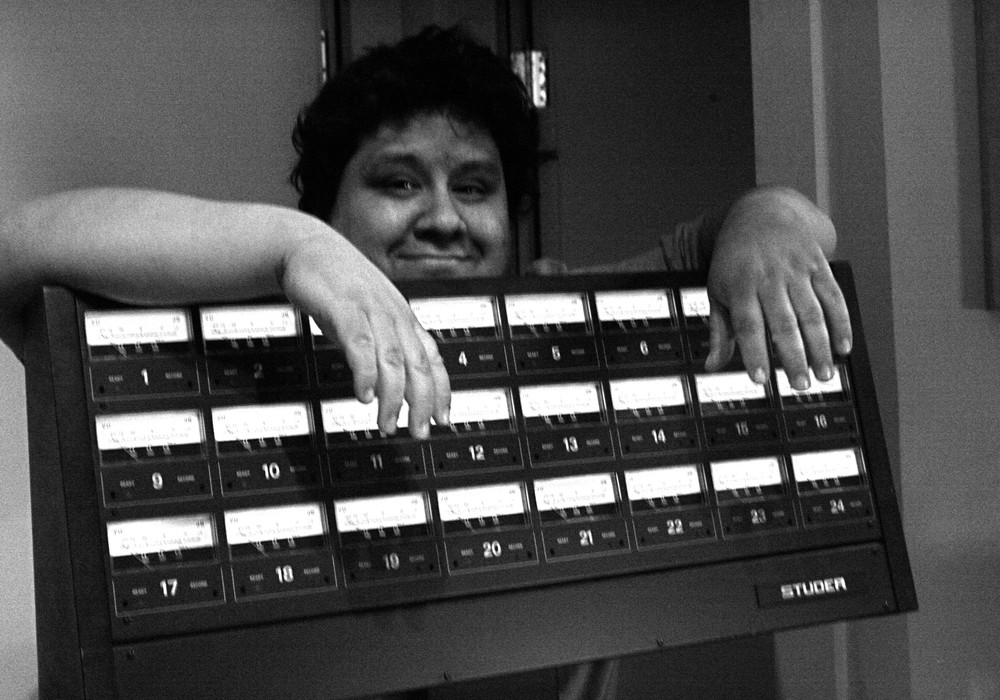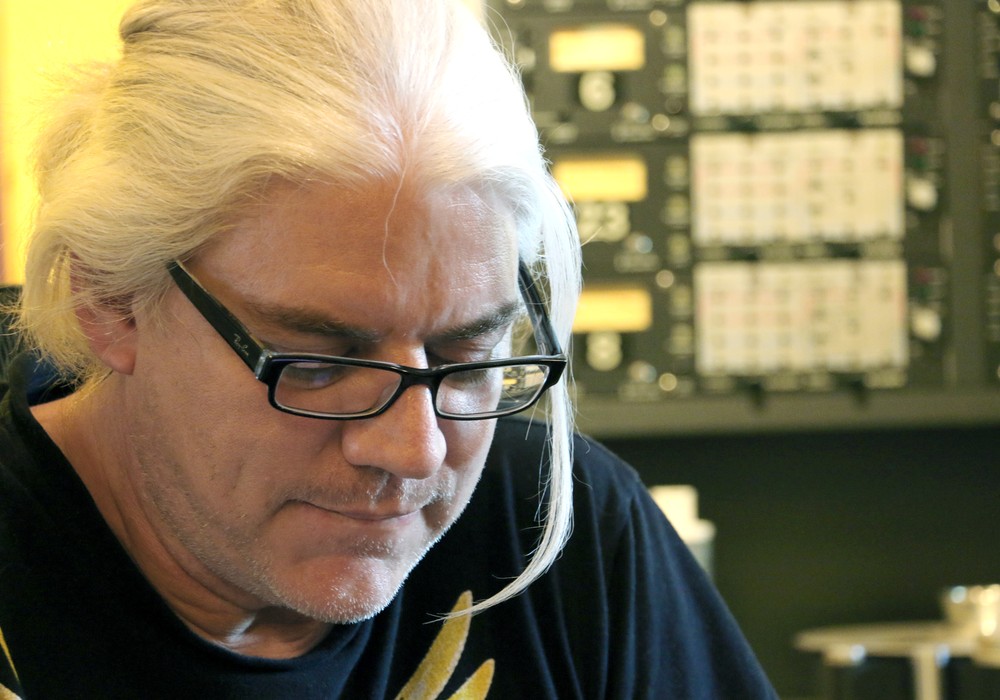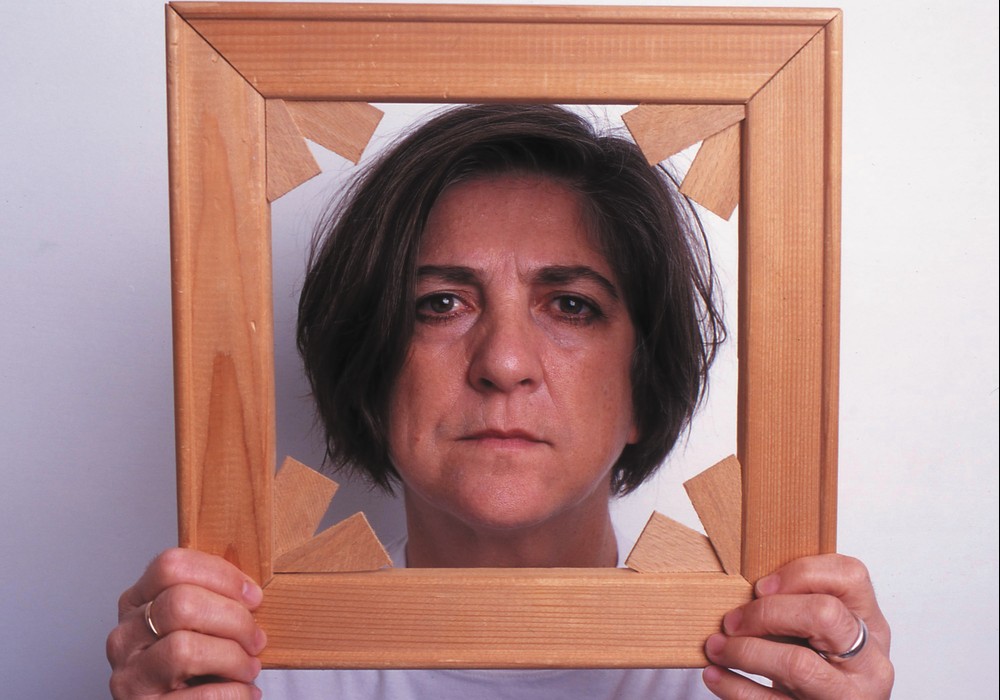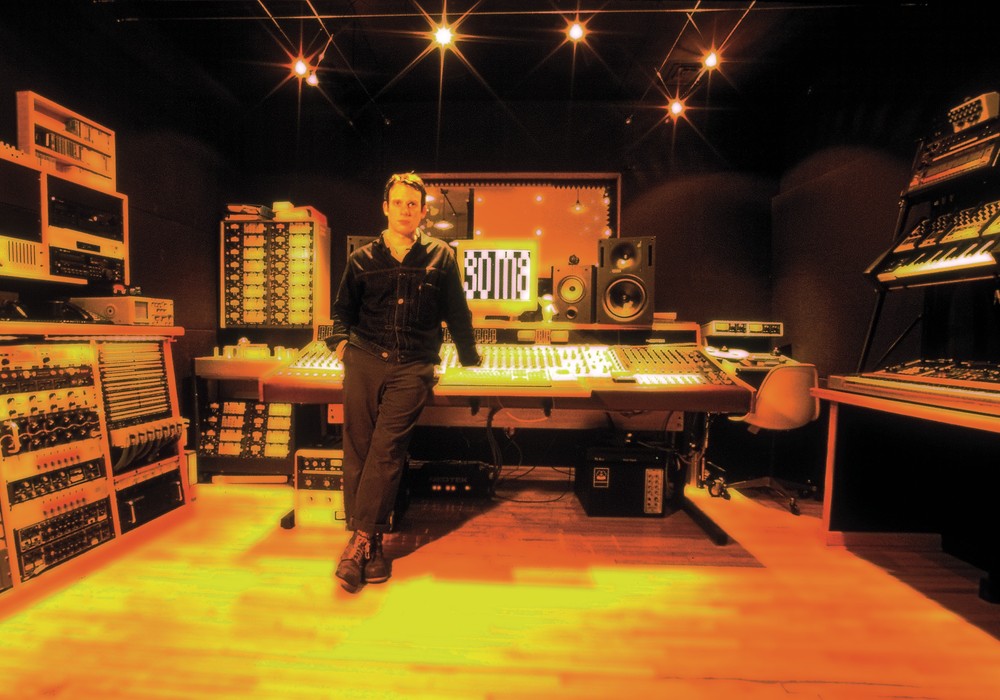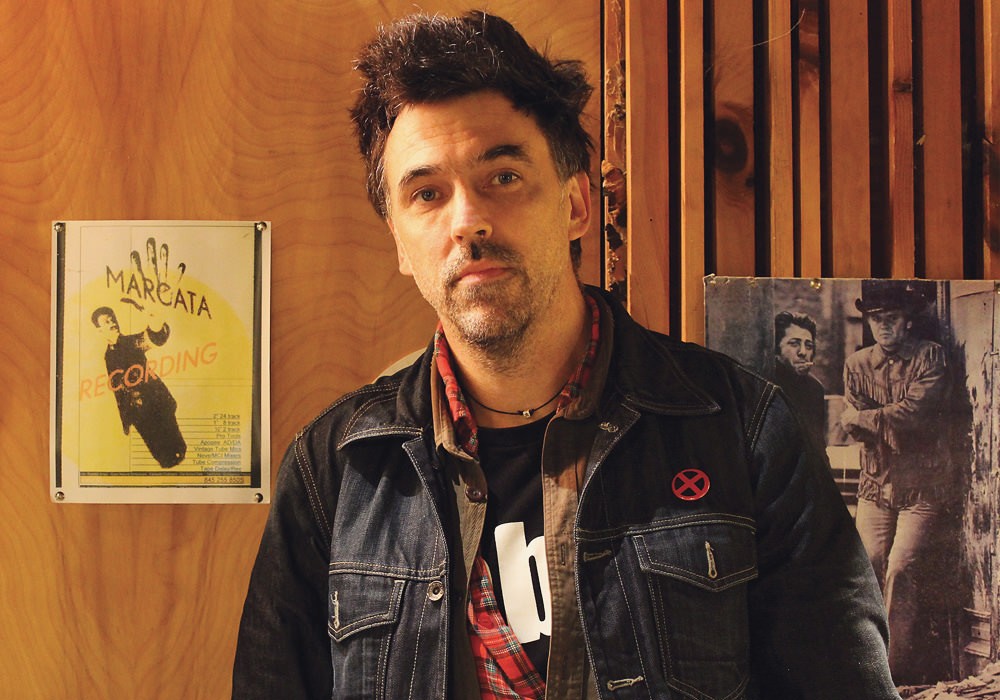In the recording world Joe Chiccarelli is very well known. He got his big firÌ break engineering Frank Zappa's Sheik Yerbouti, which turned out to be a big seller, and now he's respected for his work with Hole, Tori Amos, U2, American Music Club, Beck, Shawn Colvin, the Stranglers, Stan Ridgeway and many more. He is a classic LA producer, bringing huge racks of gear to the studio and renting more, but he is also really down-to-earth about recording, what makes a great song, and interested in crazy sounds and cool gear. Plus he's a big fan of Tape Op! We caught Joe while he was up in Portland working at Supernatural Sound (where Craig manages and engineers) producing an album for Five O'Clock People. He was also in the middle of recording an album for the Pulsars in Chicago at Kingsize Sound Labs. A busy guy. We met at Jackpot! and had a lively conversation over bagels and coffee.
One thing that I really picked up from you is that it's not about what gear you set up. I mean, it's important to pick the right mic and all that, but you go for whatever sound is emotionally compelling, not necessarily which sound is better technically.
Yeah, I really believe in that. I mean, everyone is a fan of Tchad [Blake]'s [#16] stuff. Tchad's stuff, by all standards, is tweaked and bizarre and everything else, but man it sucks you into the music and it supports the songs. I think the more I do this I find it's like this deep emotional process of stripping myself of everything I know about all this and getting to the music. Thinking, "How can all this bring out the best in the song?" Sometimes it is the super hi-fi glossy recording and other times it's the total broken, cheap microphone and tons of distortion, compression and everything else. Basically what's going to really, emotionally, make you have some kind interaction with the song.
How do you find the right approach to things like that. You get a certain amount of time to work with an artist and you're trying to get to that level. I always find that's the hardest thing for me.
It's weird. Sometimes it's a real simple intuitive thing that you instantly know, "Oh, okay, I know what will make this work." Other times it's like this process of elimination; of thinking, "Ok, this is the way I know to get to it," and you go there. Yeah, you're right, that stuff can eat up time and it can burn people out and all that. I mean, obviously, if you're producing a record you go through preproduction and all that. The thing I really try to do is to get close to the artist and try to figure them out and try to figure out what they want. The best records that I've done, in terms of that, are records where I've understood what the artist was all about. That includes understanding their weaknesses too, knowing what to avoid and where to push them and that sort of thing. I'm sure everybody goes about it different ways, but I think that the more you're in tune with the song, even if it's a really horrible song, you try to figure it out. "Ok, this is really horrible, but where's the beauty in it, where's the one great thing, how can we make more of that and less of this other stuff that makes it weak". On whatever level you are, at the time. I don't mean level of expertise, but I mean level of like: Are you connecting with the technology, are you connecting with the arrangement, are you connecting with the songwriting? What are you working on at the time? You have your catalogue of sounds in your head. If I use this old crystal mic through this piece of gear, I'm going to get this kind of result.
The more work we've done the more things we have to draw from.
Absolutely. I know for me, personally, the more I do different types of music the better I get. It always seems like if I do an industrial record and the next record I do is a folk record that there's something you bring with you from that other project that you, unconsciously, subtly incorporate into this new thing. It somehow makes it makes it a little hipper, a little more unusual, and you don't even know what it is. It's not like you go: "Hey guys let's use this distorted loop." It's just having that wealth of experience, of different variety. Any player will tell you that if he can play classical stuff, country stuff or whatever; he can bring more things to the table in terms of the nuance in his performance.
In my case I'm sort of the house engineer and studio manage. I get to watch everyone who comes in and that's a great thing. I tell you, I learned so much more from that than I ever learned from reading Mix or Modern Recording Techniques.
I think, ultimately, the best way to learn is to make the mistakes yourself, to do it. Sometimes I wish that I was assisting [assistant engineering] longer than I actually had because I loved seeing Geoff Emerick [#57] and Geoff Workman at work. All those people who are like monster guys. A lot of times when I produce stuff I won't engineer it because it's too cumbersome. It's always good getting someone like Craig or this guy in LA, Chris Fuhrman, that I work with [who's also mixing the Five O'Clock People album]. It's sort of like, "Well what if we did it like this?" "Yeah, ok sure, try it." The next thing you know it's like "Wow that's exactly what I was thinking of." Maybe a different route, but it's great. So there's a lot of ways to get to the same point.
There two things that can happen that I've found out: One is that everyone plays it way too safe. Or different ideas are introduced and people kind of feed off each other. Occasionally there's that time where somebody else is producing and I just feel like I can't do anything.
It's probably that way 50% of the time. But I love being proven wrong, 'cause then you know what the right way is. You really think you should be going down this road and then someone goes, "Well, wait a minute. What if you did this?" and bingo, you're there. Who cares how you got there or what it took in the end. It's the end result that matters. No one really cares what the process involved was.
I read in Mix, they were asking you and these other engineers about recording vocals. You kept saying "Well, try this, but really it always changes and I can't say that this always works."
There's nothing that works with vocals! The mic that works for one person, usually doesn't work for anybody else and a lot of times it's different mics for different songs. Preamps and parts of the room and acoustic spaces and motivations and headphone mixes and all that stuff. It's, once again, the performance and all this stuff is a means to that end.
The '80s were a strange time for recording.
I hated having the three digital reverbs on the snare drum and all that goofball stuff. Somewhere in the mid-80s, after the Linn drum machine became this staple — where every record had some kind of drum machine incorporated into it — I started noticing that when people heard anything that had a drummer with real time or choruses that moved and verses dipped, that people were physical uncomfortable listening to it. They got so used to listening to these programmed beats where everything was quantized. I mean physically they couldn't dance to it on a dance floor. That's kind of sad to me. Even if you go back to all those '60s and '70s disco records that you go and dance to, they groove. They don't have perfect time, but they groove.
I find that a lot of bands think they need to add keyboards and percussion. It's always this last minute thing that ends up being the most embarrassing stuff. They realize they don't know where to fit a little thing on the keyboard, or that nobody can play the tambourine.
Percussion, though, can really make a record. It's weird, those little touches that just bring things to life. Sometimes it can totally cement a funky groove on a track. You're always looking for that glue in a record that holds it all together. The one organ pad or the electric guitar thing, whatever it is that fills all the missing holes.
You're always mixing, how you track and how you'll put something down on track and you do a lot of bouncing tracks to set levels and things.
I hate that indecisive thing. I try to approach it like, "Ok, I've got a picture of where I want this record to go" I just aim for that. So, in a sense, I'm always mixing and that means I'm putting stuff down on tape at the levels and in the balance that I want. I mean I don't put all the faders at zero and record like that. But I definitely record things so you can leave the faders at one level and there's your record. If you know this part needs to be subtler in the verses you record it a little lower. We did that with the Leslie track as we put the guitar/Leslie track down on one song, I sat there and rode the levels. During a couple of big sections in the song I swelled it up. You can probably do a little bit more or less of it when you mix. But at least every time you bring up the song it isn't this guess work thing of, "Where's my record, where do I want it to go." There's the song the way it's supposed to be. If there's three things on a track — there might be a background vocal in the verse a tambourine in the chorus and guitar in the bridge I'll print them at the level they're supposed to be in the mix so that fader can sit there the whole time. You don't have to go, "Oh yeah I forgot the bridge is coming up, I've got to crank that guitar way down." All the stuff that takes you out of the picture for a second. I'll print all effects and stuff, I mean I won't print them on a lead vocal track, but any kind of guitar effects or whatever. The more I can get to the finished mix in the overdub stage during tracking. I mean I have no fear about compressing, EQing, or printing effects or whatever. I want it to be done.
When you were having me do that little mix yesterday I just pushed the faders up. It felt a little bit silly. I sat there for a few minutes going "What do I do? I should be mixing." I put a little slap on the vocals and then it was like, "You want to look at this?"
Yeah it was like "Put some more top on the vocal and turn up the accordion. We're done."
Part of that probably, I would imagine, would help with the overdubs stage, because when people are hearing what they're working on is starting to sound like it's gelling.
Exactly. And you go "Ok, this sounds like the song, this sounds like the record, but you know what? The outro is missing something. That's the only part that falls short for me" I hate that thing of every time you're working on a project for awhile, if you don't commit early on it seems that every time you bring up the tracks you get a totally different balance and a totally different approach to where the song goes. Obviously, sometimes, that can be a magical thing, but for the most part it feels like every time you put up the record it's a different record.
Headphone mixes are often neglected.
That's really true. With vocals more than anything. It's great because I'll sit there and tweak a headphone mix and in the sense of like if I see somebody's really ahead of the beat or behind the beat. I give them different things to make them play differently.
And it really works, I've been really amazed at how well it works. You just find that thing that makes them lock.
I always feel bad for players, you know, having to sit there and work on headphones it's just horrible. I'll always try to bring somebody into the control room as often as possible.
I try to offer that often. A lot of times people don't want that.
Really? They feel uncomfortable.
I'd much rather drag my bass around....
YEAH! Definitely!
I don't know why people would pass on that.
I think it's kinda nice to feel more anonymous on the other side of the glass. That way you don't feel that the guy's right there watching you make mistakes.
You can blame the headphone mix!
I've worked with guys that are operating in the control room and they're like, "Okay, give me a little bit more me, and little bit more of that, more of that. Turn the overall up." Bingo! The performance is locked in.
I've had that with bass players a lot of the time. You go back and retrack their bass and you can just nail it.
Yeah, it's actually better sometimes. It's really better than what they put down. And you would always think "Well gee, they're in there with the drummer. It's happening at the same time, they're three feet away from the drummer." It should be better, but it's not. Yeah it's weird. I have this voodoo thing about that performance thing so I'm always spooked about like that original bass track being locked in and I'm always nervous about redoing it and stuff. I'll go back fifteen times and listen to the original and the new one and well it's better! Gee.
You put a lot, especially on yourself and on whoever's assisting, a lot of pressure on them to keep the vibe going, so when the band starts nailing a song we can get take after take in no time.
Having to rewind a reel of tape, sometimes in that minute and a half that it takes to get to the top of the reel the focus can be blown. That's the one thing that I think is different between experienced players and younger players. You have to build this momentum to this point where you will get three or four good takes right in a row. Where I think those seasoned guys are capable of delivering that level all the time, anytime. That's the one thing that I'll say about all the studio guys, they're pretty amazing like that. Usually with those guys you got to be together at capturing that first performance cause usually it will be the best, where with inexperienced people it's like the tenth one. It's always tricky especially with vocalists. Working with Etta [James] you better guess the mic pre level, you better guess the compressor cause chances are from note one it's going to be great. Imagine what it was like recording Sinatra or James Brown or someone like that.
Get it right the first time?
First time? Like before the tape rolls. Cause they're on ya know?
It's like working with Dylan even to this day, like his best takes are his first or second takes and then forget it, he's not going to do it again. Daniel Lanois discovered that, I think, where's he's actually gotten good albums out of some of these takes. Because he gets them the first time through and builds around that.
There's something to that. I always wanted to work with Van Morrison I always loved Van Morrison as an artist. And somebody told me this great story about where he insists that the tape machine, the two-inch tape machine, is rolling in record when he walks in the building. I'm assuming that the band is out there ready to play and Van walks in and if he feels inspired, man, he doesn't want to wait. It's great! It's obviously extreme, but there's something to be said for it. Capturing that moment. There's a Brian Eno [#85] quote somewhere about "The best engineer in the world is the guy that is ready to get the vocal before it actually happens." In other words has the sound all set up and is ready to record because chances are you might miss something if you don't.
I've been really super conscious that the recording process should be really kind of hidden to the artist in the studio. I try to maintain a really low profile in a way, just try to make it seem like we are just rolling through. "Oh, let's do some vocals. Yeah. I'm all ready to go." You want to be invisible in a way.
That's a good point.
I had a band comment the other day, "Everything you did was so fast, you were ahead of us, you had drums sounds. Everything was moving really good." They had never been in that experience before. They worked in small studios before.
Where everybody sort of learning as they go. So it's this whole constant process of fiddling about.
It makes me feel bad if something's not patching right. Just like "I'm really sorry. Go have lunch."
It's true, that thing of always moving forward, the shark.
There's Oblique Strategies that apply to most of this stuff.
I have the Oblique Strategies cards in my Palm Pilot [hand-held computer]. You dial them up. I find that stuff for me it's a little more helpful in mixing. I don't actually use it that much. It's usually more like "Hey, let's show the band this." People would get a kick out of it. In mixing I'll just think "Ok, what's wrong with this picture." And I'll think. "What's the most outrageous thing in this record. Let's make it more outrageous" Or "What's the moodiest thing. Let's make it moodier." When you think."Ok, this pad, or whatever they put down, is nice and vibey and stuff. It sits there and it's really doing a nice thing." Then you think, "Well why don't I even make more of that than this" Even though it's working and it's accurate. It's weird when you deliberately make moves. You know, double everything or look at the subtlety as opposed to the big picture.
Take the weakest element and make it stronger. Things like that make you go "Let's see." It's good.
That's one thing I don't mean to transgress, but sometimes working with somebody else in terms of a mix is a good thing because you'll sort of feature one part that you got hooked on. He'll kind of look at you and go "You really like that? This thing over here is really cool."
Just to touch on the nuts and bolts thing though. It wouldn't be a good Tape Op interview 5without mention of equipment. You carry a lot of equipment with you, but I was surprised when all the racks showed up. Yeah, you have some nice high end stuff but you've got a lot of toys, that are just cheap cheap stuff. What are some of the greatest things that you've found, cheap stuff, that you can find out there.
Everyone's hip to old Altec stuff now. Those Shure Level-Locks are just mondo ridiculous compressors. I use stomp boxes all the time. We'll put stuff through it all the time.
You carry a hundred of those things with you at least?
I probably have 50 or 60. That stuff to me... it's the cheap stuff to me that has more personality than the H-3000 and all that kind of stuff. It gets back to that old school thing about how those guys come up with stuff. They had to be really ingenious and they used tape loops around a mic stand and all that weird stuff. Maybe the modern day equivalent is to use cheap gear. You know, what's really good and I keep looking for: You ever see those Ibanez delays that were meant for guitar. They're this brown two rack space [AD202]?
Yeah we have one here in the studio.
Some of those early 80s things are really really good because they bucket brigade [capacitance delay] stuff and they had a little bit of warmth to them but they had a little bit of cheese factor too. I think that stuff is great, overload the mic channel or all the obvious stuff you do.
You discovered the Audio Technica mics.
Yeah man, this has got to be the best find of the year. Those Pro 37Rs. We put them up the first day, I don't know what we started with, [Neumann] KM 84 or whatever. I used those on acoustic guitar I love the way those 37Rs sound, and it sounded okay. I was knocked out by the sound. "Hey let's try this Pro 37R." Every song we'd start tracking I would keep taking them down and trying something else. Nine out of ten cases I would come back to it.
Did you use them for acoustic?
Mostly for acoustic guitar, some fiddle some mandolin. We didn't try it on high hats.
Larry used to use them as overheads
Yeah we used to use them here.
Man these are amazing. They're punchy sounding, they're present. I talked to a friend at Audio Technica and he said the problem is as a microphone company people expect them to build this thousand dollar fancyshmancy studio pro microphone, and when they try to pitch to people this $100 microphone, everybody's like "You're a big pro microphone company and this is what you're trying to tell me to use?" You go to the car dealer, you don't want the bottom of the line model, even though it might be a really great car. You'd rather get the top of the line thing because you think it's got everything. That is the find of the year. I love that microphone. You never know if it's maybe that there's not much in there electronically or that maybe it's really simple. It's got this low end punch thing that's really cool.
A sort of darkness to it. That's what I always tell people.
Yeah exactly. And for these guys it works especially well cause they play Takamines, all those tinkley guitars. It's not like a Gibson, Martin, or Guild where it's got that chunky mid range thing. That's been one big challenge for this record. How can I get some kind of midrange in the record. There isn't anything that they play. They have airy voices, bright guitar sounds, mandolins, fiddles. The record's scooped out before you start scooping it out. So it's like how do I find instruments, how do I find things in the arrangement, how do I find sounds that will fill in that gap in the record. Those mics were a total godsend.
What about old digital stuff. There's a lot of fun old digital stuff that people kind of neglect because people are rejecting digital.
We were talking about Delta Lab Effectrons. I think that thing is great. It maybe a little noisy, but for a quick little flange or chorus I think they're totally cool. I think those old Ibanez-Sony 201 reverbs are kinda cool. You can pick up one for $200 for that really slick reverb sound. They're really great.
And built like a tank.
Yamaha Rev 7's.
Yeah, Rev 7's are worth $350 or something now. Yamaha SPX 90's I live by those things. I love those. I like effects that are dark because they usually, for me, find their way in the track a little bit better then all that tinkley shit.
My effects return area over here has just a high and low EQ on it. Just roll off the high end and everything starts to fit together.
I roll the top off the reverb all the time.
It's a trick that controls noise.
Definitely makes it so much quieter. A lot of cheaper reverbs give you hiss. The [Alesis] Microverbs have fun sounds and are so cheap, but you roll off a little highs and they're cleaner and fit in.
My favorite digital delay is the PCM 41 the 42 sounds great, but it's too clean.
It has this kind of dark, distorted weird thing to it.
And even though those are a really nice Lexicon, they're only $300 too.
Actually that [Lexicon] Vortex you have sounds really good. We used that once or twice.
Did you bring any mics up with you?
I got a new [Neumann] M 147 that I think sounds really good. It sounds really interesting. It's really present in the mids, that's really cool. We have D12 on the kick, we used the Audio Technica 4060 on Drew's vocals. I thought that sounded really good for him. [Sennheiser] 441 on the bottom of the snare. That's one of my favorite things, something about that mic for bottom snare mic. Cause it's kinda of sizzley sounding on top and it also rejects a lot of kick drum so I really like that underneath the snare drum. What else did we do?
As far as the rest of the mics we used. We used the Sony mics for overheads.
Oh yeah the C37s as overheads sound really great. Those things sound really good. I forgot how good they sound.
Craig loaned me one of them for quite awhile. I used it on vocals. For a string band [The Dickel Brothers] we used one C37 in omni with the guys around playing. We did stuff later with a single Earthworks.
I like those mics. I only used them once or twice they're a little too pristine and sweet and clear.
They're technical
Yeah exactly! Like that B & K thing. Like an instrumentation mic or something.
They're like that measurement mic. They're really good for overheads. Kind of center them around the cymbal you're trying to accent more. Then use a room mic looking at the drums and you get a good quick balance on drums.
We actually did that for a bunch of things. I was trying to get the record to sound as big and punchy and sort of like a balance between natural and radio friendly.
We tried my Sytek mic pres.
I thought they had a little tinselly thing on the tip top to. They had that kind almost Massenburg quality to them.
They're just so slick sounding. When I first got mine I'd been running through like these 1272 Neves or my Neotek. When I plugged those things in I literally thought that somebody had shot a lot of silicon spray into the mic cable or something cause the sound came through so much faster.
Right. They are really fast sounding. Like the Hardy's and stuff they're super fast.
It was unbelievable — it sounded like everything improved.
As much as I'm addicted to Neve's I forget how slow they can be. Obviously for the bottom end stuff you can't get better, but even like the difference between an API and a Neve on snare drum or whatever. They're really quick. These things were even faster than any of that old gear.
They peak out really easy.
Really?
I haven't found an outboard pad that I like yet. That's the problem.
I know it's like sometimes you're stuck doing that thing and there's something about it. I don't know if everyone is using cheap resistors or if it's going through...I don't know what it is but none of those things sound good.
I'm so wary using pads at all. I know people turn them on all the time.
I find it's just another sound. Like I'll bring up a fader and if I find that's it's almost like too punchy or too aggro sounding, I'll put the pad in and bring the trim up. You find that it softens it a little bit. I use mic pres like a compressor. That thing of figuring out how hard something needs to be hit. You know like the toms, like Neve's or old Tridents on toms. That was the trick that those guys did. They would bring the pres up just to the point where they were crapping out and then maybe back it off one notch. They would run those hotter, so you would get more bottom or more compression out of the mic pre.
You don't run a lot of compression on individual drums but you do a lot with room mics. You put a lot of compression on that.
I like really hearing the transients. I kind of get a little nervous mucking with it going to tape. If I compress the snare, it will be with that second mic. Very rarely would I compress the overall snare thing. Unless there was a certain thing I was really going for. But it's like, "How much excitement I can get out of the drums", ya know? That transient thing seems to be pretty important in terms of making stuff sound natural, but also localizing the beat. If you got a kick drum that's squished a little bit, you can really mess with the time. I go crazy flipping phase buttons on things. Because really you can change the whole groove of something by pushing this snare drum back a little or the kick forward. Sometimes I use it to your advantage. What should hit you first.
I can really hear that sometimes. It feels nice. The snare is outside of the mix and then bring it back in. I never make up my mind because nothing is ever 180 degrees out of phase.
Jonathan Little, who's this tech in LA that used to work at A&M for years, was actually building a box that was a two millisecond super high quality delay. That's what your doing when you're time shifting basically. So that's what he was going to do specifically for bass amp. So you could dial it in.
We talked about delaying the DI a tiny tiny bit. Line it up, but if you don't want to destroy your signals in a cheap delay.
No, but if you do it on a bass amp, it's usually a tortured signal to begin with. I always wanted something like that. I think that would be really great.
We were talking about mic pres and stuff. Have you ever come across any really inexpensive ones that are good or any kind of substitutes. You know for someone with a small set up and a cheap mixer and they trying to find someway around this whole thing.
Everyone knows the evils of the Mackie mic preamp. They're small and hard. You have to be really safe with them or you have to use them as a distortion generator. There's no in between.
Well you were saying you liked some of the early Allen & Heath consoles.
Yeah Stan Ridgeway, from Wall of Voodoo, and I made this record at his place and he had this old Allen & Heath console. It was this ugly brown color. He got it from Stewart Copeland. This thing sounded amazing the mic pres sounded great on it.
I was really really impressed with that console. We ran a lot of stuff through it and the record sounded really cool.
Overall I'm pretty impressed with older SoundCraft stuff.
Yeah some of the stuff was really really good. The Neotek sounds really great. Dave Trumfio's [Kingsize Sound Labs in Chicago] got an Elan, which is not the top of the line one. I think that thing sounds pretty good.
Yeah we were looking for one for here. We were trying find something like that.
I think that they're like 40 grand maybe. Not cheap at all.
You can get them cheaper than that though. I've seen them down as low as $15,000. For a console that good that's cheap.
Yeah, I don't know. I haven't used Presonus things or any that other people are building like those eight channel preamps. There's a lot of great stuff out there.
I was wondering if you had tried any of the Art mic pres.
No, I haven't tried that at all. A lot of people I know really like that. Honestly, I haven't tried that.
Bellari/Rolls?
No I haven't heard that either.
It's interesting.
Is it.
Yeah it can be really good. It can make overheads kinda come to life in a weird way. I think it adds a little break up.
A little crunch on the front end stuff. What other gear.......
It's always fun to tell people....
The only problem doing that...
You start that cycle going.
Yeah and prices shoot up.
"Albini recommended it."
It's like ribbon mics. Trying buying a ribbon mic now. Forget it. I always think if I'm putting up a ribbon, I'm putting it up for a reason. I wanted that rolled off chunky dark soft thing. Kingsize has this Beyer M320, which kind of looks like Beyer's version of a D12, but it's squarer around the edges. This thing rocks, it's great on guitars. It's really fat sounding, but it's got a little bit of bite to the attack. IF ANYONE OUT THERE KNOWS WERE TO FIND ONE CALL ME! I've been looking for one. It really sounds good. Those Altec 1591 compressors I think are really good. Those old Altecs you can get them for like $350. As a discrete compressor they're really good. Now everyone is into the broadcast stuff.
We got some Orban things in the back.
I was mixing this record recently, and the guys wanted it to have this really tweezed '70s-'80s sort of sound, Like that New Wave sort of sound. I did the whole mix with that in mind kinda got it close, and I was like "I don't know if this works." The studio I was working at had one of those old Orban Parametrics. I put it through that and added a tiny bit of EQ. But just going through this thing it was like phase shift city. And instantly it sounded like a Thompson Twins record or something. It was so cool. We just ran the mix through it. it just gave it this fizzley, cone filter bad IC kind of sound. It was the funnest thing. I was like, "Wow and people used these all the time on everything."
I think that's one of the points we could even make is that, what we're saying about the ribbon mics. A lot of times being technically good, or having good specs on a piece of gear means nothing.
Exactly they just say "This will do this and look how impressive this is."
Goes to 20 kHz.
Right, who cares! Sometimes your better off with a piano if the top is 6k. You get rid of all that weird ringing overtone, that on one particular piano might be a bad thing.
We had that $5,000 tube compressor in the studio the other day. Somebody brought it in for us to try out. And we were trying to make the thing should good and we just couldn't. I just didn't like the sound of it. I wasn't drawn at all to the sound of it.
It's super open and super clean. If you were doing a film score or if you were doing a solo acoustic guitar, I think it would probably be great. But I tend to gravitate towards things that have a lot of character. Having this list in your brain of a hundred and ten different sounds and then going "Ok, lets pick this one for that." Maybe if you had the best bass player with brilliant tone then you wouldn't want to change it any way, then that's the best way to record. Through something like an Avalon or Massenburg. But a lot of times people bring in funky instruments or they're not great players or the particular character of their instrument doesn't work well in the setting of the song. You have to find the piece of gear that helps incorporate it. You want something that has it's own character, you put it through a cheezy old direct box or the B15 guts that you have. Have you tried that thing he's got?
No.
Somebody took the preamp section of an Ampeg B15 and turned it into a direct box. It sounds really sweet. We used mandolin, and fiddle...
And guitar.
It sounds really good.
Running a mic into it?
No we were just running the pickup into it. Just using it like a direct box, not really using the tone controls, just like going through this thing.
Where did you get that?
I got it at a garage sale, believe it or not. It was already rack mounted. It cost me $25. One of my best garage sales finds ever.I paid $25 and that same night I went and got rid of my Alembic preamp, which cost me almost $800. The Alembic just sounds like crap. I didn't want it anymore.
Yeah that's a really good sounding box. That's where the 80s went awry electronically. Everybody started eliminating transformers and all that stuff because it rings and it does this to the top end. All these new microphones, people aren't using transformers now. It's a different sound, but that's the one thing about going through those old Collins and old Gates and stuff. Even if you don't use the compressor, just going through all that iron, just rounds things out and it rings in a certain way. I was telling Craig about this time when Bob Ludwig mastered a record for me and I just hated the way the mixes sounded. I was just hating life, no matter what I did I couldn't get this record to sound right. It was off of all digital stuff, and it just sounded cold. I thought it was me I hated the job I had done. It didn't sound right to me, no matter how I EQ'd it. I sent it to Bob, thinking "Oh man he's going to hate me." Getting the phone call like "What happened to you, this really sounds terrible. I had to use 40 dB EQs to make it sound like music," and all these sort of things. He sent me the disc and I listened to the disc and it sounded brilliant. I sheepishly called him back going "Ok, read me the riot act Bob, what did I do, how bad, what did you have to fix." He was like "No, you know I thought it sounded cold so I took this old pair of transformers that I have in the rack here, and I just ran the mix through the transformers. I didn't EQ it hardly at all." It sort of rounded the top off and rounded the bottom off and made it sound a lot more musical.
And he got paid how much for doing that?
So it takes five grand for him to figure that out. But I do think that is the brilliance of a great mastering engineer. Knowing that one final little element that will take your mix to the next point. If it's a 100 dB of compression or if it's........
You don't want that mastering engineer to go "Sounds great." And you're like "No, no, fix it."
Sometimes you do need that objectivity of him to say "You know this does sound great I'm not going to touch this. Let me even out the level of the songs, and we're done." I think that is the art of the great mastering engineer. Knowing what not to do. As a mixer, I'm sure everybody likes a large percentage of what Bob Clearmountain does. I've had Bob mix stuff for me and I think that's his brilliance, knowing what not to do. Knowing when to be subtle and when to be extreme. There's like a really great art to that. There's not a lot of old great mastering engineers left most of them are retiring. So where are new great mastering engineers?
We've got this guy Troy we use up in Seattle at Spectre. I've been really happy because he leaves stuff alone and lets it breathe. Yet it comes out being a loud CD. I've been really happy, and he's young.
That's really cool. Nancy Hess [a Portland artist] was telling me that she loved what Tony Lash did on her CD. She thought Tony was awesome.
Tony's very good.
Tony can save things. Tony saved my band's record.
I'm amazed, having sat in on two sessions with Tony.
You know that's something for your readers, because I'm sure everybody's been burnt by bad mastering once in their life. I have no fear saying to somebody, "Look, I'm not sure whose the best mastering guy for this record. Would you do one song on trial?" Obviously Bob Ludwig won't to that for you because he's booked until November, but I think a lot of guys will do that. I think just like somebody might cast a musician for a certain part or use a certain studio for a certain sound. I think mastering applies too. I think that there are certain guys that know how to make aggressive records there are certain guys who know how to make Hi-Fi records. I always wait until I'm done with my mixes to go, "This record is a little wimpy. I've got to send it to Howie [Weinberg] [#30] cause I know Howie is going to make it aggressive. With a band like Five O'Clock People, I know that it's got to be really musical and Hi-Fi to some degree. It's got to be a little tweaky, but it has to be Hi-Fi, so then I send it to Bob Ludwig.
I do that as well, I take things to Tony, I refer things to Spectre. Different projects, given, what I know people's different strength's are.
I think that's really important. If you're a producer you would have your Roll-A-Dex of players and know that this guy is good for that. You got to do the same with mastering engineers or mixers or whatever. Sometimes you know going into it. "I don't think this guy is going to get this music." Twisted guitar whatever stuff. He does bluegrass records. He won't get it.
